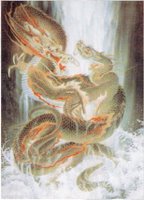Bending the Third Rail
Because We Should, We Can, We Do
Cost of the War in Iraq
(JavaScript Error)
Thursday, November 02, 2006
That's One Big Motha' Dragon
 One of my favorite economics blogs is discussing China's economic power today. Tim Iacono of "The Mess That Greenspan Made", quotes from several articles, including this one, to make a point:
One of my favorite economics blogs is discussing China's economic power today. Tim Iacono of "The Mess That Greenspan Made", quotes from several articles, including this one, to make a point:BY THE end of October China's foreign-exchange reserves are likely to top $1 trillion, twice their level two years ago and more than one-fifth of global reserves. This handsome sum would be enough to buy all the gold sitting in central banks' vaults (indeed, twice over) or almost all of London's residential property.Think about this for a minute.
China's massive hoard is the result of its large current-account surplus, [Walmart walmart and more walmart] significant inward foreign direct investment, and big inflows of speculative capital over the past couple of years. In theory, flows of foreign money into China should push up the yuan, but China has resisted this, forcing the central bank to buy up the surplus foreign currency. The growth in reserves has slowed in recent months, but it is still averaging a hefty $16 billion a month.
China's official reserves already far exceed what is required to ensure financial stability. As a rule of thumb, a country needs enough foreign exchange to cover three months' imports or to settle its short-term foreign debt. China's reserves are equivalent to 15 months of imports and are six times bigger than its short-term debt. The explosion in reserves is also a headache for the central bank. It creates excess liquidity, which risks fuelling higher inflation, asset-price bubbles and imprudent bank lending.
...
How that money is invested has big implications for the world economy, not just for China. Brad Setser, head of global research at Roubini Global Economics, estimates that about 70% of it is invested in dollars, mainly Treasury securities. This has propped up the dollar and reduced American bond yields—by up to 1.5 percentage points according to some estimates. A big shift out of dollars could therefore push up bond yields and hence mortgage rates, damaging America's already crumbling housing market [my emphasis].
U.S. interest rates should be one and a half percent higher than they are but for China buying up our debt. So while we send enormous numbers of dollars overseas, via oil purchases, to fund activities (of all kinds) in the Middle East, we are similarly sending enormous amounts of money to China. And China is happily enabling our consumption "habit" by graciously, and artificially, helping to keep the cost of borrowing down so we'll just keep buying! Afterall, like OPEC, any good pusher knows that you keep em' hooked but you don't kill em'!
Do any of you actually believe that this fact doesn't give China enormous leverage in all other international affairs, and specifically over us? Tim goes on and outlines, via two other articles, just how China is using it's position to vacuum up the world's natural resources to fuel it's economic engine, which is just now just idling.
What's really disturbing is just how little America voters seem to understand about this little dynamic. The economic situation that has developed between the U.S. and China is not unlike what happened between the U.S. and the Middle east over the past 30 years, and look how well that's turned out. Yet most Americans are simply happy to keep-a-shoppin' while pasting little ribbons on their S.U.V.'s.
Foolish.
The policy implications for the United States in this little untidy economic scenario are profound. It's like Uncle Sam has one ball being held by the Saudi's, and the other being held by the Chinese. Wonder who'll squeeze the hardest and longest?
0 Comments:
About Me
- Name: Greyhair
- Location: Wine Country, California
I'm a very lucky person with every allergy known to man but still happy to be enjoying a wonderful life living in the best place in the world!
Blogroll
The Big PictureBillmon
Blah3.com
Born at the Crest of Empire
Eric Alterman
Eschaton
FireDogLake
Feingold's Blog
Dan Froomkin
The Huffington Post
Hullabaloo
The Illustrated Daily Scribble
Jesus General
Juan Cole
Matilda's Advice and Rants
Mia Culpa
MsJan Quilts
Needlenose
The Oil Drum
Political Animal
Political Wire
Spooks of the Ozarks
Talk About Corruption
TalkLeft
Think Progress
War and Peace
The Washington Note